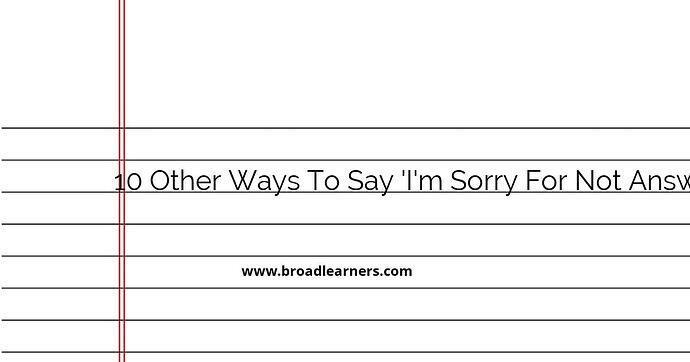When you haven't been able to respond to someone's message or call, it's important to apologize for the delay or lack of response. Saying 'I'm sorry for not answering' is a straightforward way to express your regret, but there are other alternative phrases you can use to convey the same sentiment:
- I apologize for the delayed response
- Sorry for the late reply
- My apologies for not getting back to you sooner
- I'm sorry for the delay in responding
- Please forgive me for the delay in getting back to you
- I regret not answering earlier
- Apologies for the lack of response
- I apologize for the delay in getting back to you
- Sorry for not replying sooner
- I'm sorry for the delayed reply
Let's explore each alternative phrase with examples to understand how to use them effectively.
1. I apologize for the delayed response
Using the phrase 'I apologize for the delayed response' acknowledges the delay in answering and shows that you take responsibility for not replying promptly. It conveys a sense of regret and professionalism.
Example:
Dear [Name],
I apologize for the delayed response. I have been dealing with a high volume of emails and messages, and yours unfortunately got overlooked. I appreciate your patience and understanding.
Best regards,
[Your Name]
2. Sorry for the late reply
When you say 'Sorry for the late reply,' you express regret for not responding in a timely manner. This phrase is straightforward and concise, while still conveying your apology.
Example:
Hi [Name],
Sorry for the late reply. I have been caught up with several urgent matters and was unable to respond sooner. Thank you for your understanding.
Kind regards,
[Your Name]
3. My apologies for not getting back to you sooner
By saying 'My apologies for not getting back to you sooner,' you take ownership of the delay and express regret for not responding promptly. This phrase is slightly more formal and emphasizes your accountability.
Example:
Dear [Name],
My apologies for not getting back to you sooner. I had some unexpected commitments that required my immediate attention. Thank you for your patience.
Warm regards,
[Your Name]
4. I'm sorry for the delay in responding
When you say 'I'm sorry for the delay in responding,' you acknowledge the delay and express your regret for not answering promptly. This phrase shows empathy and understanding towards the other person's wait.
Example:
Hello [Name],
I'm sorry for the delay in responding. I had some unexpected personal matters to attend to, which caused the delay. Thank you for your patience and understanding.
Best regards,
[Your Name]
5. Please forgive me for the delay in getting back to you
Using the phrase 'Please forgive me for the delay in getting back to you' shows humility and a sincere desire for forgiveness. It conveys that you understand the inconvenience caused by your lack of response.
Example:
Dear [Name],
Please forgive me for the delay in getting back to you. I had some unforeseen circumstances that required my immediate attention. Thank you for your understanding and patience.
Sincerely,
[Your Name]
6. I regret not answering earlier
When you say 'I regret not answering earlier,' you express remorse for not responding promptly and acknowledge that it was a missed opportunity. This phrase shows sincerity and a desire to make amends.
Example:
Hi [Name],
I regret not answering earlier. I understand the importance of your message and apologize for the delay. Please let me know if there's anything else I can assist you with.
Best regards,
[Your Name]
7. Apologies for the lack of response
By saying 'Apologies for the lack of response,' you acknowledge that you did not respond as expected and express your regret for the absence of a reply. This phrase is concise and to the point.
Example:
Dear [Name],
Apologies for the lack of response. I apologize for any inconvenience caused and assure you that it was unintentional. Thank you for your understanding.
Warm regards,
[Your Name]
8. I apologize for the delay in getting back to you
When you say 'I apologize for the delay in getting back to you,' you take responsibility for the delay and express your regret for not responding promptly. This phrase shows accountability and professionalism.
Example:
Hello [Name],
I apologize for the delay in getting back to you. I had some unexpected circumstances arise which required my immediate attention. Thank you for your patience and understanding.
Best regards,
[Your Name]
9. Sorry for not replying sooner
When you say 'Sorry for not replying sooner,' you acknowledge the delay in responding and express regret for not answering promptly. This phrase is concise and straightforward, while still conveying your apology.
Example:
Hi [Name],
Sorry for not replying sooner. I had some unexpected commitments that required my immediate attention. Thank you for your understanding and patience.
Kind regards,
[Your Name]
10. I'm sorry for the delayed reply
By saying 'I'm sorry for the delayed reply,' you acknowledge the delay and express your regret for not responding in a timely manner. This phrase is straightforward and concise, while still conveying your apology.
Example:
Dear [Name],
I'm sorry for the delayed reply. Unfortunately, I was dealing with some unexpected circumstances that required my immediate attention. Thank you for your understanding and patience.
Sincerely,
[Your Name]
Did I miss anything? Respond below
